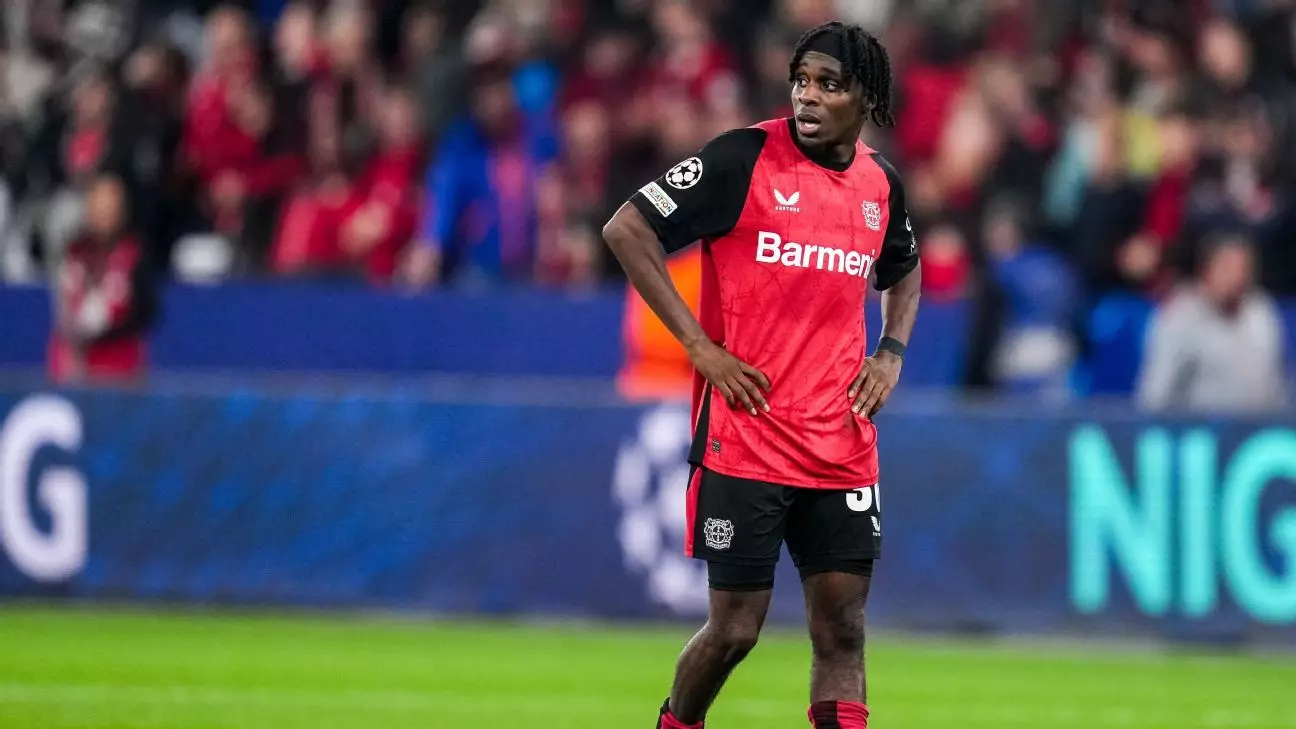The world of football often oscillates between euphoria and despair, encapsulating the rollercoaster journey that even the most formidable teams experience. Bayer Leverkusen, a club that recently basked in the glow of double victories, now finds itself grappling with a nascent yet glaring crisis. In this article, we will dissect the evolving narrative surrounding Leverkusen, from their impressive unbeaten domestic campaign last season to the chaotic situations that have marred their current performance.
Last season, the moniker “Laterkusen” emerged, a tribute to their knack for scoring late winners that drew parallels to illusionist Uri Geller’s famed spoon-bending tricks. The term evolved, reflecting Leverkusen’s growing stature, as they racked up an impressive haul of goals in stoppage time, giving rise to more flattering titles like “Meisterkusen” and “Doublekusen.” Fast forward to this season, however, and a new phrase has both emerged and stuck—”Luckypunchgegentorkusen.” This term encapsulates the frustration felt by supporters and pundits alike as Leverkusen squander leads and succumb to late goals, as evidenced by their recent defeat against VfL Bochum.
This new moniker derives from a blend of German and English terms that uniquely convey the nature of their struggles. Lucky Punch illustrates how Leverkusen concedes goals that often feel undeserved and against the run of play. The loss against Bochum, particularly a late goal from Japanese forward Koji Miyoshi, epitomizes this unfortunate trend. The team’s ability to maintain composure and decisiveness in critical moments has dramatically waned, leading to uncharacteristic performances that expose their vulnerabilities, particularly when they hold a lead.
Leverkusen’s recent performances starkly contrast their dominance from the prior season. The squad, boasting a roster that appears even stronger than last year’s, ironically seems to lack the same effectiveness and tenacity.
Already, after just ten games, they have squandered a staggering eleven points from winning positions—a glaring statistic that exemplifies their struggles. Dropping points against teams they should conquer—such as Holstein Kiel and Werder Bremen—reveals a troubling pattern that has emerged. A notable instance was the dramatic turnaround against RB Leipzig where a 2-0 lead evaporated, resulting in a 3-2 defeat that left fans bewildered. Together, these incidents breed a sentiment of missed opportunities that could dictate the future of their season.
Internal differences and communication issues have been cited as potential contributors to their declining form. Sporting CEO Simon Rolfes recently highlighted a need for a more uncompromising approach, suggesting that the team’s psychological and physical resolve is not meeting expectations. The captain, Lukas Hradecky, candidly mentioned a deficiency in the right body language, while Granit Xhaka pinpointed communication breakdowns as a significant hurdle within the squad’s dynamics.
Worse yet, team cohesion appears to be suffering from the new recruits’ inability to integrate meaningfully into the squad. Players like Martin Terrier and Aleix García, among others, have been unable to consistently claim starting positions, highlighting an ongoing struggle for cohesion in the squad. The individuals who flourished during the successful double-winning season seem to oscillate between brilliance and mediocrity. Familiar faces such as Hradecky, Edmond Tapsoba, and Jeremie Frimpong have not performed at the levels expected, raising questions about motivation and confidence. The dip in form from star striker Victor Boniface further demonstrates the club’s fragility, as losing his spot in the lineup impacts the team’s offensive balance.
The prospect of reviving their league ambitions seems daunting, especially with Bayer already nine points adrift of Bayern Munich, traditionally their most formidable rivals. Traditional powerhouses are rarely forgiving; thus, aspirations for a season reminiscent of their double-winning success now feel fragile. However, it is essential to look beyond domestic league failures. The UEFA Champions League has provided some solace, allowing them to showcase their strengths on an international platform.
Upcoming matches, including a crucial encounter in the DFB-Pokal against Bayern, will gauge the team’s resolve under pressure and prove pivotal in shaping the season’s narrative. The implications of the match could be monumental; should they pull off an upset against Bayern, it could serve as a catalytic moment, reigniting the team’s confidence as they regroup. Moreover, it would be a timely reminder that while their current form may be questionable, the potential for resurgence still exists.
As they prepare to face Heidenheim next, the urgency to address internal issues and bolster on-field execution grows. One can only hope Leverkusen arrives at a turning point—transforming from frailty to fortitude in their pursuit of glory once again.

Leave a Reply